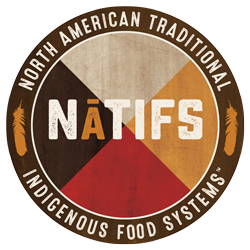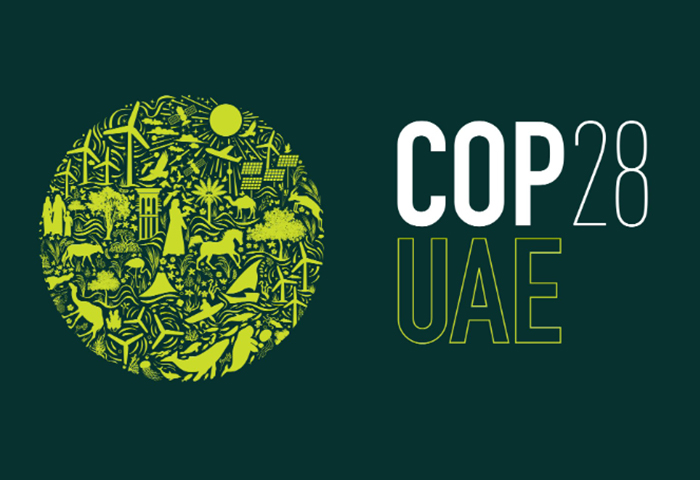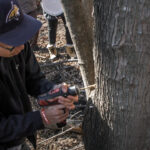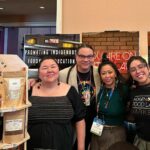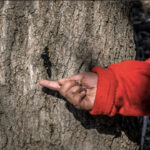Like most things in Dubai, Expo City, the mini-city grounds where the 2023 UN Climate Change Conference (COP 28) was held is big. Really big.
Spanning over one thousand acres, the futuristic campus where over 70,000 people from around the world converged for 13 days was a stomping ground for big minds to contemplate big ideas for saving the climate. NATIFS founder and Executive Director Sean Sherman was one of them.
Divided between “Green Zone” and “Blue Zone,” (public vs. official delegates), COP invited Sean to both zones to share an Indigenous perspective of food sovereignty and practices to combat climate change.
Thanks in part to funding from the Rockefeller Foundation, Sean traveled over 7,000 miles and 24 hours to the United Arab Emirates to speak on two topics: “Indigenous Expertise in Practice: Moving from Rhetoric to Action,” and “Civil Society as a Catalyst for Food Policy Change.”
“It’s important for Indigenous voices to be at the table,” Sean said of his participation in the famous (and sometimes infamous) global conversation. “If you’re not on the world stage, someone else will move in to take up that space.”
Delivering a keynote presentation on millennia-tested Indigenous principles and insights on living with the planet sustainably, Sean’s co-presenters included Jonathan Jennings of Health in Harmony, an organization reversing tropical rainforest deforestation; and Nonette Royo of Tenure Facility, which focuses on securing land and forest rights for Indigenous peoples.
Despite food and agriculture accounting for about a third of global greenhouse gas emissions, the conference has not spotlighted food and agriculture traditionally over the past almost three decades. A Wastage Footprint and Climate Change Report by the United Nations Food and Agriculture Organization is quoted as saying, “If food waste were a nation, it would rank as the third-largest emitter globally.”
Sean’s keynote address, which begins and ends with the social impact of colonization, is especially well-poised to lend perspective to this conversation, as colonization is inextricable to capitalism, the true transgressor in food system disorder.
“Food shouldn’t have to cost money,” is a phrase that Sean often repeats. For countless generations in Indigenous communities, it did not. Food systems were a community-wide affair since it was the most time-tested method of survival for anyone and everyone in the collective society.
But in today’s capitalist-based food systems, the consumer’s desire is capitalism’s command.
“Producers will produce what the consumers want to consume. . . with neither ends of the food supply chain (farm to fork) gaining legitimate clarity on their roles and responsibilities for urgent climate action,” reports Khaleej Times in an article by Somya Hehta on COP’s food impact spotlight this year. Frustratingly, governments have taken a largely hands-off approach to legislating the capitalist nature of food production.
Sean’s long-standing contention that Indigenous people have always had the blueprint for living sustainably with the planet was a crucial voice, particularly at this year’s food spotlight conference.
And yet, despite the heavy presence of scientists, governments, farmers, chefs, journalists, and many other stakeholders contributing ideas to the ongoing problem of climate change, the real issues standing in the way of true change are apathy, selfishness, and greed—three of the obvious results of a capitalist food system.
“This is why we do what we do,” Sean explained at a panel moderated by Food Tank founder Danielle Nierenberg.
“Highlighting [Indigenous] value systems, agriculture, soil management, forestry, oceanography and all the other things that Indigenous peoples have been doing for countless generations–science is barely catching up to Indigeneity when it comes to food systems.”
He added: “We really need countries to raise stake holding Indigenous voices when it comes to education and environmental concerns.”
And yet, only about 300 of the 70,000 attendees at this year’s COP represented Indigenous leaders. As the Indigenous-led NGO Cultural Survival reported, the coal, oil, and gas industries had over 2400 delegates registered at this COP.
The practical result at the conference itself can feel frustrating – a perspective that Sean shared with his audience.
“There are lots of talks and little ‘bubbles’ all over the place in this conference. How do we bring these bubbles into a bigger space? We should be connecting Indigenous people on a global scale to showcase this voice. A lot of times we’re tokenized and put in the background. That needs to change.”
Perhaps ironically but unsurprisingly, the negative effects of climate change disproportionately impact Indigenous communities, with issues including injury from extreme or unpredictable weather and thinning sea ice – which can trap people far from home; changing snow and ice conditions that limit safe hunting, fishing, or herding practices; malnutrition and food insecurity from lack of access to subsistence food; and contamination of food and water, according to the US Climate Resilience Toolkit.
COP 28 has drawn widespread criticism for failing to include the phasing out of fossil fuels, as well as for being held in a location, the United Arab Emirates, a government that has a poor human rights record which includes detaining dissidents, as well as prohibitions on freedom of expression and peaceful assembly. Dubai also has an unfavorable reputation for its treatment of migrant workers.
Sean’s final words at the conference were that COP needs some shaking up from “a rebel’s perspective,” a comment that was met with applause.
“This is my first COP, and I see a lot of disjointedness,” he went on. “As a global community coming together, we can create spaces that don’t have to follow this particular [model]. This has got its own system going on, and it’s going to continue to be a slower and slower boat to maneuver. We have to move the dial away from pure greed and land and wealth hoarding and move it slowly towards humanity. . . You just do it. You make it happen.”
Read NATIFS’ full Climate Change Manifesto here.
